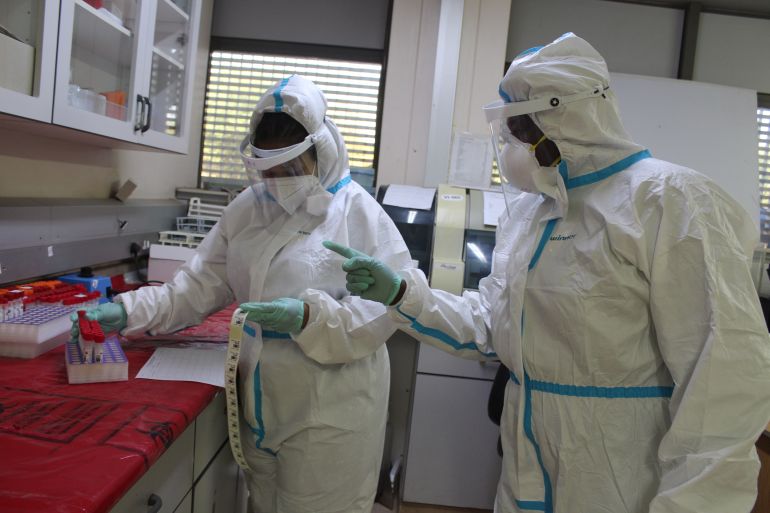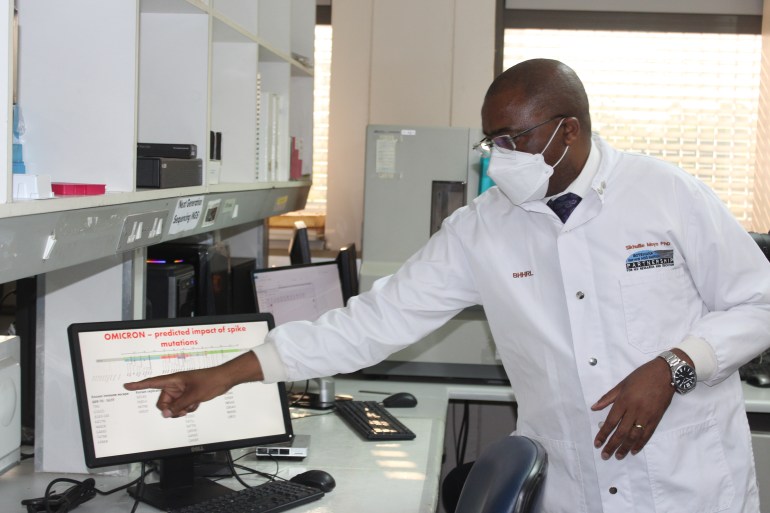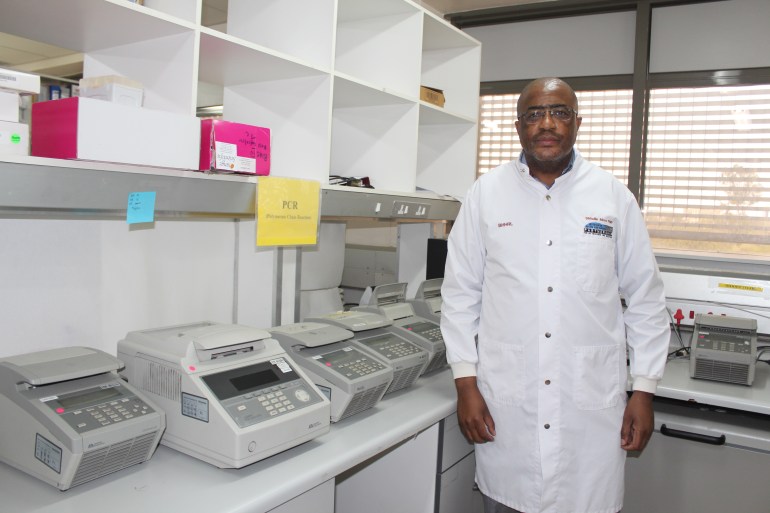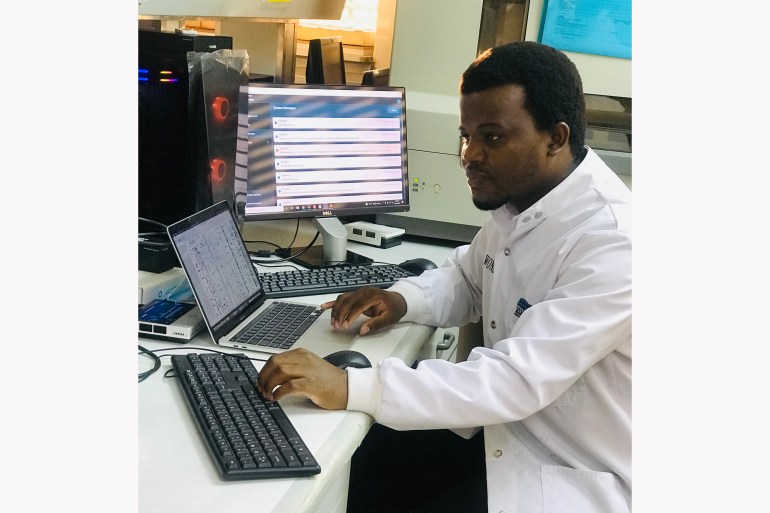Inside the Botswana lab that discovered Omicron
Travel bans to African countries feel like a punishment for scientific transparency, say researchers who found variant.

The day that Dr Sikhulile Moyo ruefully calls “Omicron Day” started like any normal day, or as normal as one can be for a medical virologist in the middle of a global coronavirus pandemic.
That Friday morning, November 19, the 48-year-old Zimbabwean prayed as usual with his wife and children, wolfed down some cereal and then raced to beat the traffic in Botswana’s capital Gaborone.
Keep reading
list of 4 itemsMexico’s teachers seek relief from pandemic-era spike in school robberies
‘A bad chapter’: Tracing the origins of Ecuador’s rise in gang violence
Why is the US economy so resilient?
On the way to work, the gregarious laboratory director sometimes played his own gospel recordings, but that morning, he listened to a Ghanaian pastor and motivational speaker.
Once at the Botswana Harvard HIV Reference Laboratory (BHHRL), Dr Moyo and his team checked on the PCR tests that lab coordinator Dr Dorcas Maruapula had left running overnight, all taken from Covid-positive samples.
As per their weekly routine, the researchers then processed the nucleic acid – the molecules that make up the virus’s genetic material – extracted from the samples using a palm-sized MinION sequencer. The device produces full sequences of genetic data in real-time that allow the team to look for any evolutionary changes in the virus as it is transmitted.
Wonderful Choga, 31, a bioinformatician from Zimbabwe, kept an eye on the computer as the USB-connected MinION outputted genome sequences, his usual cup of coffee at the ready.
But later that day, as the team were getting ready to go home, something odd happened.
“There were four sequences showing very strange patterns that we had never seen before. I felt a lot of emotions in my heart,” says Dr Moyo, recalling rising feelings of concern.
On the computer, mismatches in the samples’ genetic code against the original SARS-CoV-2 virus had been flagged across rows of multicoloured letters.
The discrepancies were so great that Dr Moyo worried there was some kind of mistake. But after the team ran thorough quality checks, they still came up with the same results.
“It was quite alarming to us simply because we’d never seen such a lineage in Botswana,” adds Choga. “It was heavily mutated.”

‘An AK-47 to kill an ant’
At least 30 mutations on the virus’s spike protein, which binds to receptors on human host cells, and more than 50 in total – far more than in other variants to date – signalled a worrying finding.
Dr Moyo consulted with his longstanding collaborator Dr Simani Gaseitsiwe, the lab’s other senior scientist, and after “working all weekend” to cross-reference their results against other known variants, he decided on Monday morning to report the unusual sequence to Botswana’s Ministry of Health and Wellness.
They confirmed that the samples had come from four foreign nationals, visiting diplomats who tested positive for COVID-19 on November 11. Officials haven’t confirmed where the diplomats travelled from, saying they want to avoid stigmatising other nations, but Botswana’s president stated in an interview with CNN that at least some had “been to Europe”.
Shortly after, Dr Moyo uploaded the new genetic data to GISAID, a popular open-access database that labs around the world use to rapidly share genome sequences. Meanwhile, scientists working in parallel in South Africa and Hong Kong were also sequencing the new variant, subsequently designated B.1.1.529, and then named “Omicron”.
Their discoveries – to which South Africa alerted the world on November 25 – set in motion a chain of events that moved stock markets and saw some governments impose sweeping travel restrictions on Southern Africa.
The travel restrictions – condemned by the UN secretary-general and the World Health Organization (WHO) among others – directly affected Botswana’s economy and those of its Southern African neighbours, most of which were expecting many visitors over the holidays. They have baffled and distressed Dr Moyo and his team.
“We don’t think that the countries – ourselves, South Africa and others – should be punished for sharing our data transparently with the world,” says Dr Moyo.
“The response has not really been proportionate,” he says. “It’s like taking an AK-47 to kill an ant before you understand it. I’m saddened by the response – you do great science and now, when I see the news, I almost feel like switching off my TV.”
Observers also viewed the region, which is already struggling with vaccine access, as being punished for sounding the alarm.
The restrictions could even make the surveillance of new variants more difficult.
“We are going to be impacted even in terms of reagents (compounds used to facilitate chemical reactions, including to prepare samples for genome sequencing) that we so desperately need, as most are not transported by cargo flights but via normal airlines,” says Dr Gaseitsiwe, a molecular virologist and a principal investigator at the lab.

Working around the clock
Throughout the pandemic, Dr Moyo and his team have been working around the clock to perform a significant chunk of Botswana’s diagnostic PCR testing.
And since early 2021, they have genome-sequenced some 2,300 positive SARS-CoV-2 virus samples.
“You can ask my family. They are understanding, but sometimes, it’s a lot of hours,” he says.
Dr Moyo says that the team’s consistent, week-in, week-out genomic surveillance and systematic sequencing of positive samples meant that even though they don’t have the resources of leading international sequencing centres, they were able to quickly detect the mutations.
According to Dr Gaseitsiwe, Botswana’s genome sequence submissions to GISAID are among the highest in the African region on a per capita basis, on a par with its well-resourced neighbour South Africa.
Designated a variant of concern by WHO on November 26, some of Omicron’s mutations are “lineage-defining”, says Dr Moyo, meaning that they can be used to detect the variant anywhere.
He adds that it is not yet clear when and how it originated, although it appears descended from an early coronavirus variant and not a more recent one. Scientists across the world have been racing to assess how transmissible Omicron is and the severity of the disease it causes, as well as how effective available vaccines are against it.
“Sometimes when a virus changes like this, it might make it more wimpy, meaning it might actually die away. Or it might give it a fitness advantage. Preliminary evidence does suggest it may be highly transmissible,” Dr Moyo explains. As of December 10, Omicron had been detected in 63 countries, in all regions of the world.

HIV legacy
Dr Moyo and his team’s ability to perform real-time genome sequencing was grounded in another major disease outbreak.
“I can’t imagine us having been able to do this without the previous work that we have been doing on HIV,” says Dr Gaseitsiwe, who, like Dr Moyo, was in the early stages of his career in the late 1990s when the global HIV epidemic was at its peak in Southern Africa.
He says about 80 percent of the researchers at the BHHRL who have become SARS-CoV-2 specialists were previously working on HIV, the human immunodeficiency virus.
Many of the team’s passionate researchers were motivated to work on HIV having witnessed both the cutting-edge science emerging around the disease and the devastation.
“Saturday was reserved for funerals,” recalls Dr Moyo, whose own relatives were affected by HIV. “To see that the tiniest of organisms could cause so much havoc – I wanted to be part of the response.”
Dr Moyo joined the Botswana Harvard AIDS Institute Partnership (BHP) in 2003, two years after the umbrella organisation opened the BHHRL, its purpose-built HIV research lab and one of the first on the continent.
It was also a year after Botswana became one of the first nations in Africa to roll out free antiretroviral treatment as part of its widely celebrated efforts to combat the terrifying impacts of the HIV epidemic on its population.
While the country remains seriously affected – HIV prevalence stands at 19.9 percent among adults, down from rates as high as 35.8 percent in 2000 – AIDS-related deaths have decreased significantly. More recently, the country has achieved a major milestone by bringing mother-to-child transmission of HIV to under 5 percent, the first high-burden country to do so.
“The team really has done ground-breaking research, including research that has changed WHO guidelines, particularly in preventing mother-to-child transmission,” said Dr Shahin Lockman, an infectious diseases physician and clinical researcher at Harvard University in the United States.
Dr Lockman, who has worked with BHP since its creation in 1996 by Harvard and the Botswana government to support training and research, was referring to guidelines such as supporting breastfeeding by women with HIV who are taking effective antiretroviral treatment.
The lab started using the MiniION platform through a 2019 grant to work on HIV, but had already built capacity to look at how viruses change their genomes. Dr Moyo himself has developed methods of analysis of HIV sequences to better understand the timing of infection.
Their genome sequencing of HIV and other pathogens gave them a “stepping stone” to switch to sequencing the SARS-CoV-2 virus. “We failed a little bit in the beginning, some samples did not work. And finally, boom!” he says, snapping his fingers sharply. “Now, we are really trying to help other labs in the region.”

‘More teamwork than competition’
Dr Moyo says that the Southern African region has been “intentional” in building infrastructure to respond to other infectious diseases and describes the working environment in Botswana and at BHP as one that enables science with very limited resources.
He is quick to credit his colleagues, both at BHP and across the region.
“Science is about collaboration,” he says, sharing that he had behind-the-scenes discussions with colleagues in South Africa – a team led by Professor Tulio de Oliveira who was Dr Moyo’s PhD supervisor – confirming they were seeing the same pattern of strange mutations before the news broke.
The warmth within the laboratory team is palpable.
“For us, it’s more teamwork than competition, anyone’s success is the other one’s success,” says Dr Gaseitsiwe. “It takes time to build that trust and confidence and I think we have that special kind of setting.”
“The thing I admire in both of them is their humbleness, they really listen to us,” says Choga, of his lab’s top two scientists.
Both Dr Moyo and Dr Gaseitsiwe, who grew up in rural villages, have covered significant ground in their journeys to reach the forefront of scientific discovery.
Dr Gaseitsiwe was born in a small village in northeast Botswana. He demonstrated his scientific flare early as part of a school team that won second prize in a national competition for their project on optimising the fermentation of local brews. He was later the first of his family to go to university directly.
Dr Moyo has been intrigued by the innermost behaviour of viruses for much of his adult life but being able to pursue this interest has not been easy.
The ninth child of 17, his parents – a preschool teacher and a professional builder for the police force – struggled to pay for his education, but always encouraged him to study.
His early education was disrupted first by Zimbabwe’s war of independence in the 1970s and then the post-independence massacres in his home area of Matabeleland. He remembers being sent to fetch “the shovels” when someone was killed near the house; later a relative was murdered and his uncle went missing, never to return.
In his secondary school years, he boarded at an all-boys “bush school” run by an Anglican priest, who offered a young Dr Moyo and other boys gardening work to help pay for their tuition. This helped him go on to university, and while studying for an undergraduate degree in Zimbabwe, Dr Moyo heard about a new master’s in applied microbiology in Botswana. About a year after applying, he got a place on the course.
“I wish my father was alive at this moment, my mother as well, after the sacrifices they’ve made, to see how I’ve been part of a global family that is able to do such work,” Dr Moyo says.
He is trying to pay that help forward, mentoring younger scientists and supporting relatives with their education.

Genomic surveillance
The donor-supported BHP team hopes that global interest in their discovery will translate into more resources, be it better equipment or additional research funding – and especially around genomic surveillance.
“One hopes that the attention – unlike anything we’ve received before – will get people to appreciate the scientific research that goes on in places like ours,” says Dr Gaseitsiwe.
Additional resources would “enable scientists, especially young scientists, from this part of the world” to tackle regional challenges.
“Local scientists are best positioned to lead research institutions in the region as they have a better appreciation of the impact of the infectious diseases on the population,” adds Dr Gaseitsiwe. “Importantly, locally led research is easier to accept in an era where research is highly scrutinised.”
The Omicron discovery could also help to accelerate existing efforts to develop genomic surveillance across the African continent in an age where genome sequences are being shared in real-time like never before.
“For SARS CoV-2, this is crucial as Africa and other developing regions are lagging behind in terms of vaccination and this gives the virus some opportunity to mutate more freely,” says Dr Gaseitsiwe.
“SARS CoV-2 genome sequencing is important so that we identify the circulating variants and also to identify novel variants – this will help us to be in a better position to develop effective vaccines,” adds Dr Maruapula, who travelled to South Africa for training in SARS-CoV-2 sequencing just a week before the team’s find.
Many are worried, however, that the kneejerk imposition of travel bans could discourage scientific transparency going forward – adding fuel to a continuing debate about the potential exploitation of data produced in lower-income countries.
Dr Moyo says he’s concerned that wealthier nations with dedicated computational infrastructure could benefit from public data if it was entirely open-access to make vaccines or tests without collaborating with the scientists who generated these resources.
“Vaccine manufacturers have already started working on vaccine designs around these sequences, so that’s like providing a tool for them to configure something that can serve the world. So you are excited about that,” says Dr Moyo. “But when you know that vaccines may not come next week because flights are cancelled, or that medicines from Europe will be delayed, it’s a real roller coaster of emotions.”
A small country, a big contribution
Botswana is among the 15 African countries that met the end-September target of fully vaccinating at least 10 percent of their populations, but due to a combination of factors, including lack of supply and delivery challenges, vaccination rates remain concerningly low across the continent.
Dr Moyo hopes that a positive outcome of the pandemic will be an increase in regional vaccine manufacturing and that African governments “make a lot of noise” about vaccine inequality.
He says the world needs to take a look in the mirror and ask itself some hard questions.
“Some countries have 1 percent coverage, but other countries are boosting their citizens. Are we doing the right thing?”
Despite these challenges, Dr Moyo’s attitude remains overwhelmingly upbeat, perhaps reflective of a wider philosophy of perseverance, of always picking yourself up.
An avid singer and composer of gospel music, he sings about these and other, themes on an album that he has released online. “Singing is what keeps me going,” he says, describing how he sometimes gets inspiration for songs in the lab.
As for Omicron, Dr Moyo suspects that people might go back to samples in their freezers and find that the variant was already present. “It wouldn’t be a surprise, but I would be glad that we helped them to realise that there’s something going on,” he says. “Botswana is a small country that has provided such a contribution. I must say that I’m privileged to be a part of it.”